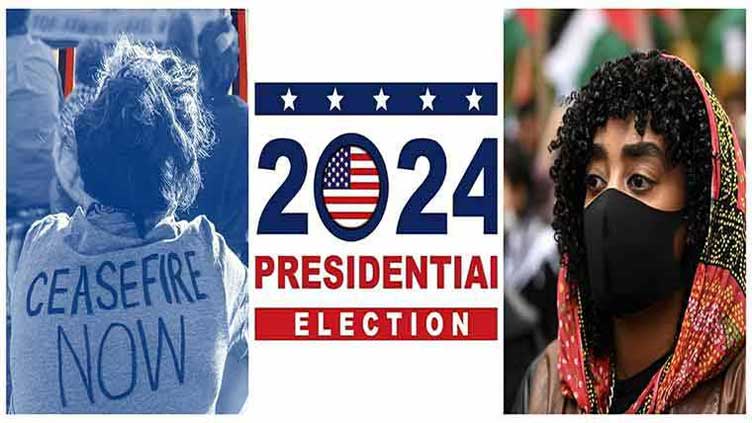Harris or Trump: Bleeding Gaza keeps Muslims in a fix

World
Pakistani immigrants, other Muslims desire to vote for Trump for his anti-war stance: reports
LAHORE (Dunya News) - As the US presidential election approaches, Muslim voters are increasingly involved, prompted largely by reactions to America’s stance on the Gaza crisis.
This raises questions on how recent events have reshaped their political perspective.
Muslims in the US represent a multifaceted voting bloc spanning various racial and national backgrounds, especially influential in swing states like Georgia, Michigan, and Pennsylvania. Recent surveys indicate that 65 percent of Muslim Americans see the Israel-Hamas conflict as a critical political issue.
Following the October 7, 2023, attack by Hamas that resulted in 1,200 Israeli deaths and 250 hostages, Israel responded with extensive operations in Gaza, which have so far claimed over 42,000 Palestinian lives. This devastating toll has sparked global protest, and for US Muslims, it’s undeniably reshaping their political perspective.
Muslims, who constitute about one percent of the US population, appear somewhat divided in the November 5 election. For many, the choice between Donald Trump and Kamala Harris centers on issues like immigrant rights. Yet, the recent violence in Gaza is prompting a reassessment, with many reconsidering their choices.
Kamala Harris has taken a defined stance, calling for a Gaza ceasefire and supporting a two-state solution, while Trump advocates for US non-involvement in foreign conflicts. Disillusioned with both main candidates’ positions on Gaza, some Muslim voters are exploring third-party options, including the Green Party’s Jill Stein and Dr Cornel West, both of whom support an end to military aid for Israel.
More to read: Trump, Harris battle for Wisconsin amid blowback on violent rhetoric
The Council on American-Islamic Relations (CAIR), a prominent Muslim civil rights group, recently published a survey of Muslim voting trends. According to CAIR, support is split nearly evenly between Jill Stein (42.3 percent) and Kamala Harris (41 percent), with Trump following at 10 percent.
Polling data reveals a close contest, with the survey’s margin of error at 2.5 percent, closely mirroring CAIR’s previous findings.
Among likely Muslim voters, 42.3 percent back Stein, 41 percent favor Harris, 9.8 percent lean toward Trump, and less than one percent support Libertarian Chase Oliver. An additional 5.4 percent remain undecided or plan not to vote.
Should Kamala Harris win, many predict her administration will echo Biden-era policies, which are widely supported by European and NATO allies. Contrarily, Trump’s potential return raises concerns about a radical policy shift.
Analysts note his “wild card” image, which may entail reinforced support for Israel, maintaining key figures in foreign policy who favor this direction.
Anti-Muslim sentiment from Trump’s base, particularly in red states, complicates the decision for many Muslim voters, torn between candidates perceived to support oppressive policies. In a recent opinion piece, Senator Bernie Sanders voiced solidarity with Muslim voters, slamming Netanyahu’s policies and the ongoing US military support for Israel. Sanders questioned Harris’s support for the war while condemning Trump’s allies for blocking Gaza aid.
Despite these dynamics, some Pakistani immigrants see Trump as a “no-war president” despite his immigration stance. However, the choice remains complex, with the Gaza crisis likely to be a defining factor for many Muslim voters in the upcoming election.
Also read: Democrats have a plan if Trump prematurely declares election victory
According to media reports, Pakistani immigrants and other Muslims desire to vote for Trump ignoring Harris.


